This post may contain affiliate links. Please read our disclosure policy.
These Roasted Chinese eggplants are caramelized to perfection! With a buttery soft interior that practically melts on your tongue with every bite, this naturally gluten-free and vegan side dish is an effortless way to add warmth to any meal.
If you love eggplants as much as I do, you’ll also love my air fryer Chinese eggplant. Perfect for parties and holidays, and is a crowd-pleasing twist on the classic!
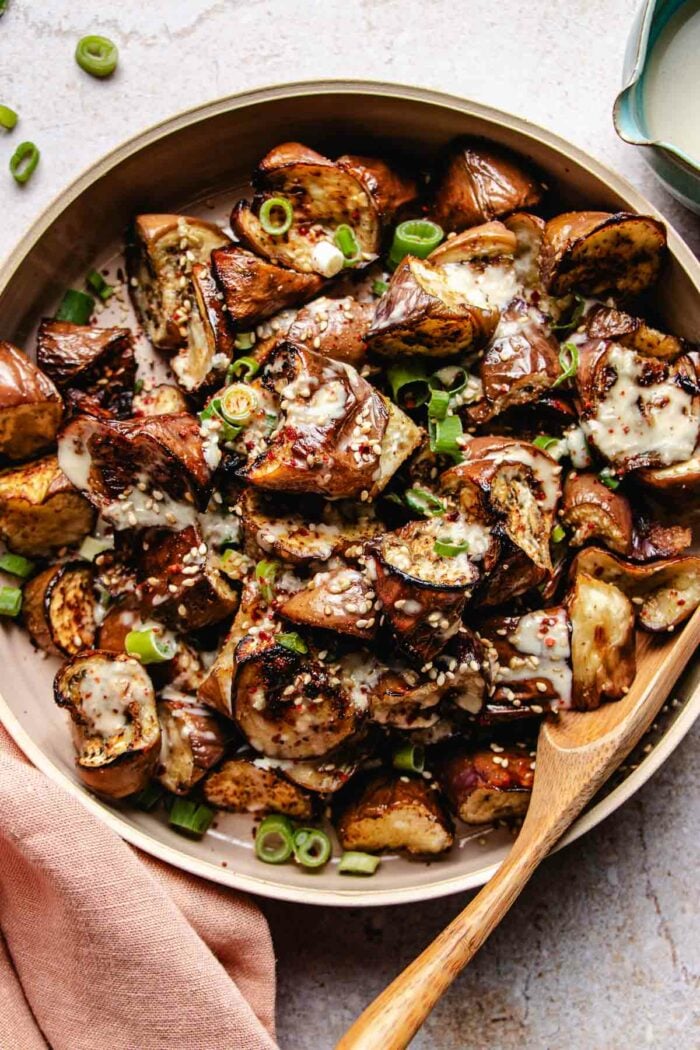
Table of Contents
Ingredients
Make delicious baked Chinese eggplant with these easy-to-get ingredients:
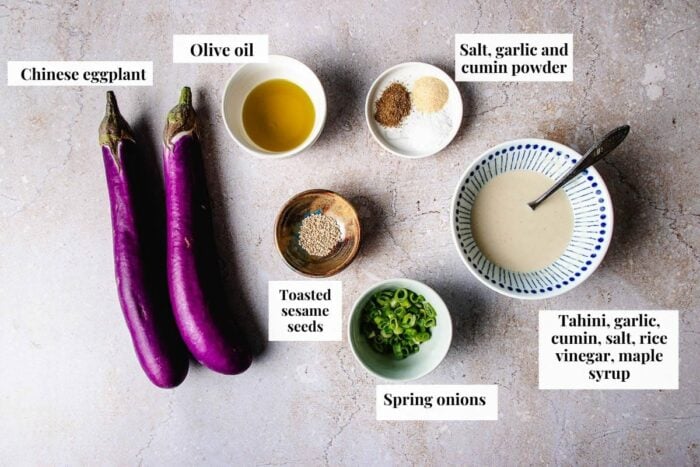
For the eggplants:
- Chinese eggplants: Choose eggplants with smooth and shiny skin with no bruises and in vibrant purple color. They should feel heavy in your hands.
- Coarse sea salt, garlic powder
- Cumin powder: This warming spice adds a touch of Chinese Xinjiang-influenced flavor that works well with Chinese style eggplant.
- Olive oil: I use 4 tablespoons of olive oil for every 1½ lb of eggplants so they are perfectly roasted without being too greasy.
- Scallion, toasted white sesame seeds, gochugaru flakes: To garnish the dish. Gochugaru adds a nice smoky flavor to the dish.
For the maple tahini sauce:
- Tahini: I use an unsalted and unsweetened version. It adds a nice toasted sesame aroma and gives a creamy texture.
- Garlic, coarse sea salt, cumin powder
- Rice vinegar: Adds a touch of refreshing flavor to brighten the flavors of the garlic-roasted eggplant.
- Maple syrup or honey: Taste your sauce before adding it, as you may not need it.
Substitutions and variations
- Ways to cut the eggplant: In this recipe, I diced the eggplant into wedges. You can also cut them in half. When roasting eggplant in halves, adjust the roasting time because you might need to cook it for a bit longer. The same thing applies to cubed eggplant.
- Different types of eggplants: My second best choice is Japanese eggplants, as they also have thinner skin and fewer seeds. Both graffiti eggplants (striped eggplants), and Globe eggplants work too, but they require a longer time to roast because of their thicker skin.
- Vary the level of spice with a touch of red pepper flakes or smoked paprika. You can even use gochujang to make a gochujang-glazed eggplant.
- Top them off with light soy sauce or toasted sesame oil before serving for a flavor variation. For a slightly nutty texture, garnish with toasted sesame seeds.
- Serve with different sauces such as garlic chili sauce, gluten free hoisin sauce, Japanese-style roasted sesame dressing, or gluten-free gochujang substitute to suit your taste buds.
How to roast Chinese eggplant in oven
Cooking eggplant in the oven is easy. Let me show you how to roast Chinese eggplant with my step-by-step instructions:
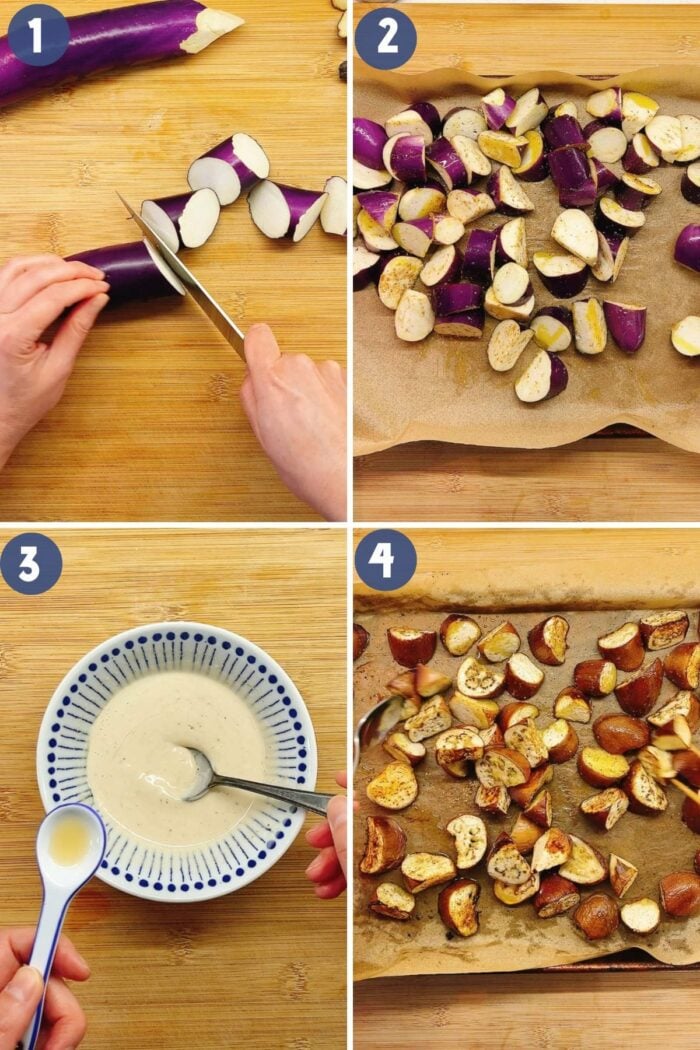
- Cut the eggplant into 1.5-inch wedges at a 45 degree angle. Roll it 90 degrees and continue cutting until it is all cut.
- Prepare eggplant for roasting — season with salt, garlic powder, cumin, and 3 tbsp oil. Place them in a single layer on a sheet pan lined with parchment paper.
- Roast eggplant at 425°F (218°C) for 15 minutes on the middle rack. Combine the sauce in a small bowl while waiting.
- Take out the sheet pan and drizzle with another tablespoon of oil over the eggplants. Roast for another 5 minutes.
- Transfer the roasted aubergine to a large serving bowl. Garnish with scallions, sesame seeds, and gochugaru, if using. Drizzle a few tablespoons of the tahini sauce over them and serve warm with extra sauce for dipping.
Should you soak or salt Asian eggplants?
Chinese or Japanese eggplants tend to be less bitter compared to some other varieties, so it’s not necessary to salt or soak the eggplants before cooking, especially if the eggplants are fresh and in season.
However, if using eggplants that are out of season in the winter, salting can help remove some of the bitterness. Salting also helps break down the fiber in eggplants, resulting in a creamier texture. So if you prefer a softer, less fibrous texture, consider salting them. I use this technique whenever I make Chinese eggplant in air fryer to improve the eggplant texture.
Soaking the eggplants in a water and vinegar solution for 5-10 minutes can help reduce the amount of oil they absorb during cooking. The vinegar soak will also help preserve the beautiful purple color of the eggplant flesh after cooking. My Chinese steamed eggplant salad recipe uses this exact method.
Just make sure to pat the eggplant slices dry after soaking and before seasoning. You don’t need to rinse them after salting. Removing excess moisture helps the seasonings and oil adhere better for flavorful eggplants.
How to make-ahead, store, and reheat
Roasted eggplant with garlic is great for meal prep and batch cooking! Here’s how you can make it ahead:
- Make-ahead: Mix the sauce 2 to 3 days before you grill eggplant in the oven.
- Storage: Pack the eggplants and the sauce separately. Keep them in airtight containers in the fridge for 4-5 days.
- Reheat: To reheat, simply microwave the eggplants on high for 30 seconds.
What to serve with roasted Asian eggplants
Caramelized eggplant is super versatile and pairs well with literally anything. Here are some ideas to get yous started!
- Rice dishes: Pair with air fryer rice or air fryer fried rice for a fuss-free, savory dinner.
- Wholesome vegetables: This dish goes great with other side dishes like crunchy Chinese cucumber salad, roasted bok choy, and salt and pepper tofu air fryer.
- Plates of protein: Include Chinese ginger pork stir fry or Dutch oven roasted whole chicken for a delicious, protein-packed meal.
Umami Tips
Roasting at high heat concentrates flavors and caramelizes the eggplant exterior beautifully. Follow these tips for irresistibly tender, delicious roasted Chinese eggplants anytime.
- Selecting eggplants: For the best quality, select fresh, firm eggplants with smooth, shiny skin. Smaller, slender Asian eggplants such as Japanese also work well. Avoid eggplants with bruises or wrinkled skin.
- Preparing eggplants: Trim off the stem and cap ends. Cut the eggplants into wedges (about 1.5-inch) pieces on the diagonal to expose a bigger surface area for roasting.
- No need to salt or soak: If the eggplants are fresh, you do not need to salt or soak the eggplants, as the Chinese variation is less bitter than other varieties.
- Seasoning: Toss 1.5 lb eggplant pieces with 3 tbsp oil. Season with salt, pepper, garlic powder, or other spices of your choice.
- Roasting: Arrange the seasoned eggplant in a single layer on a parchment-lined baking sheet. Do not overcrowd the pan. Baking Chinese eggplant at 425°F for 15-20 minutes total will yield eggplants with tender flesh when pierced, and a nicely browned and caramelized exterior.
- Sauce pairing: The caramelized roasted eggplants pair well with a creamy sauce. You can brighten the flavor with a sprinkle of lemon juice or rice vinegar.
- Finishing: Garnish with sesame seeds, green onions, chili peppers and serve with the sauce on the side.
- Serving: Enjoy roasted eggplants warm, at room temperature, or chilled. They make great meal preps, sides, appetizers, or snacks.
FAQs
The skin of Chinese eggplants is edible and nutritious. It also adds flavor, texture, and visual appeal to dishes. It’s thin, tender, and has a mild taste. Leaving it on retains nutrients and shape when cooked. Peeling is unnecessary unless it’s damaged.
Chinese eggplants can be found at Asian grocery stores, well-stocked supermarkets, or local farmers markets in the produce section. Look for smaller, slender eggplants under a foot long.
To prevent bitterness when roasting eggplant, select fresh, firm eggplants free from brown seeds and bruises. You can also salt the eggplants before cooking. Salting helps to draw out any bitterness. Rinse and pat dry before roasting.
No, you do not need to peel Asian eggplants before roasting. The thin tender skin becomes crispy and flavorful when roasted. Leaving the skin on retains nutrients, flavor, and the eggplant’s shape during cooking. Simply rinse, trim the ends, and roast the eggplants whole for the best texture and taste.
More recipes using Chinese eggplant
If you love this roasted eggplant recipe, I hand-picked a few more fan favorites for you to try:
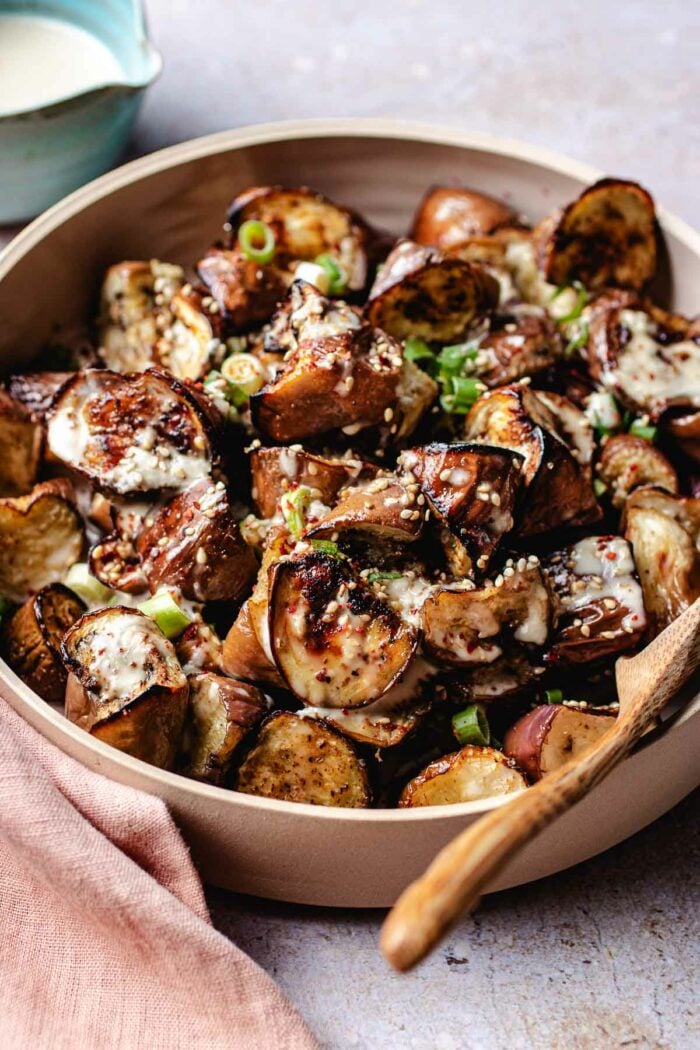
Roasted Chinese eggplant recipe (with maple tahini sauce)

Video
Ingredients
- 1.5 lb Chinese eggplants about 3 long eggplants
- ¾ tsp coarse sea salt
- ½ tsp garlic powder
- ½ tsp ground cumin
- 4 tbsp olive oil divided
- 1 bulb scallion chopped
- Sprinkle toasted white sesame seeds
- Sprinkle gochugaru flakes (Korean red pepper flakes) optional
Maple-Tahini Sauce:
- 2 tbsp tahini unsalted
- 0.2 oz. clove garlic grated, 1 medium, or ½ tsp garlic granule
- 1.5 tbsp rice vinegar
- ¼ tsp coarse sea salt
- ⅛ tsp cumin powder
- 1 tsp maple syrup or honey
- 1-2 tbsp water or more to thin, add ½ tbsp a time until desired consistency
Instructions
- Preheat oven to 425°F (218°C).
- Cut the eggplant into wedges by first holding your knife at a 45-degree angle and making a 1.5-inch (3.8 cm) long cut. Then, continue to roll the ingredient 90 degrees and make cuts of the same width and angle until it is all cut.
- Line a large sheet pan with parchment paper. Add the eggplants and season with salt, garlic powder, cumin, and 3 tbsp oil. Use your hands to coat them well on all sides and spread them out into a single layer. I recommend wearing a cooking glove to do this.
- Roast the eggplants for 15 minutes on medium rack. In the meantime, combine the sauce in a separate bowl.
- Remove the sheet pan and drizzle with the remaining 1 tbsp oil over the eggplants. Gently toss everything again. Take care not to smash the eggplants. Send them back to roast for 5 more minutes.
- The eggplants should be perfectly tender and soft on the inside and a little crisp on some parts of the skin. Transfer the eggplants to a large serving bowl and garnish with scallions, sesame seeds, and gochugaru, if using.
- Before serving, drizzle with a few tablespoons of the tahini sauce over the eggplants and serve the extra sauce on the side. Serve warm.
Notes
- Different types of eggplants: My second best choice is Japanese eggplants, as they also have thinner skin and fewer seeds. Both graffiti eggplants (striped eggplants), and Globe eggplants work too, but they require a longer time to roast because of their thicker skin.
- Spice variation: Vary the level of spice with a touch of red pepper flakes or smoked paprika. You can even use gochujang to make a gochujang-glazed eggplant.
Nutrition
Nutrition information is automatically calculated, so should only be used as an approximation.
Made a dish and loved it? Please rate the recipe and leave a comment in the section below! It helps my blog grow organically, allowing me to continue sharing free and awesome content with you. Thank you!
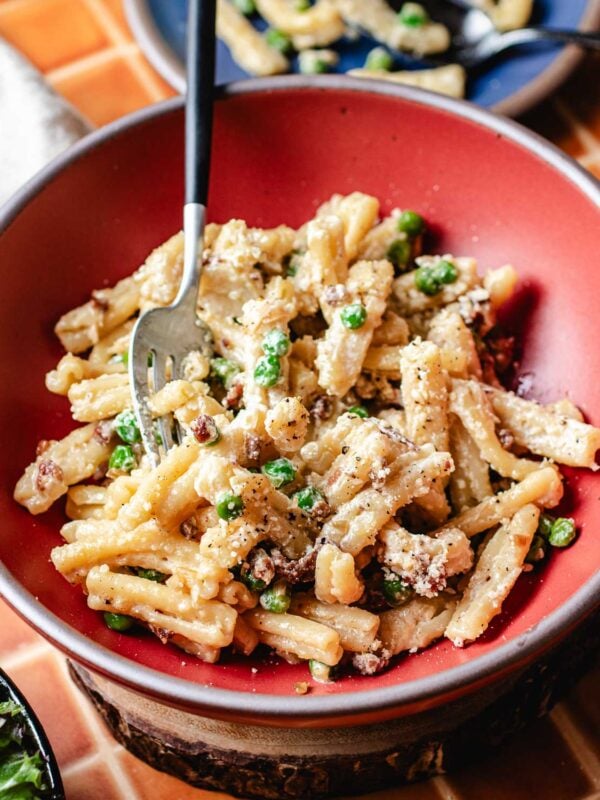
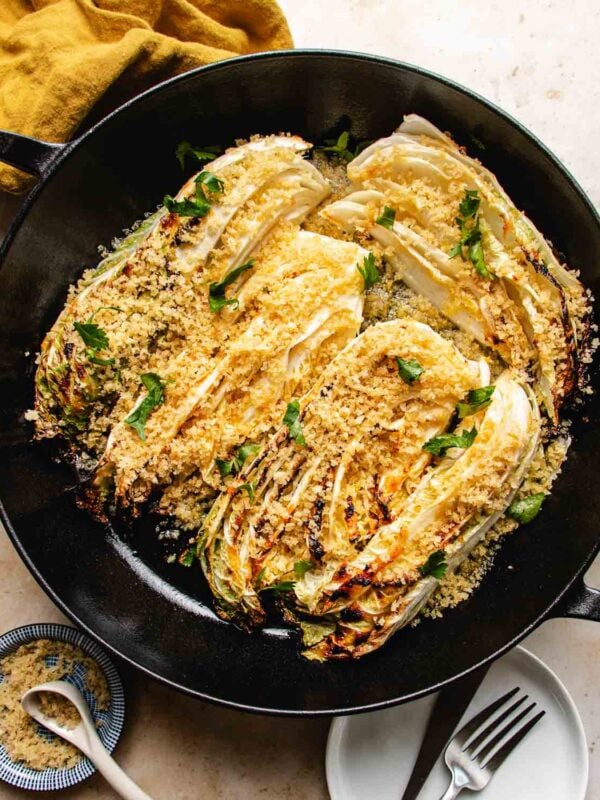
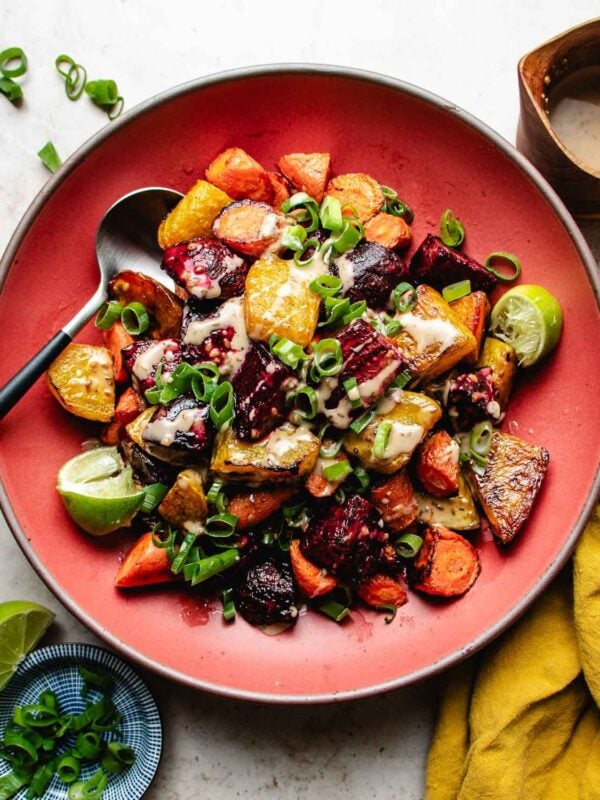
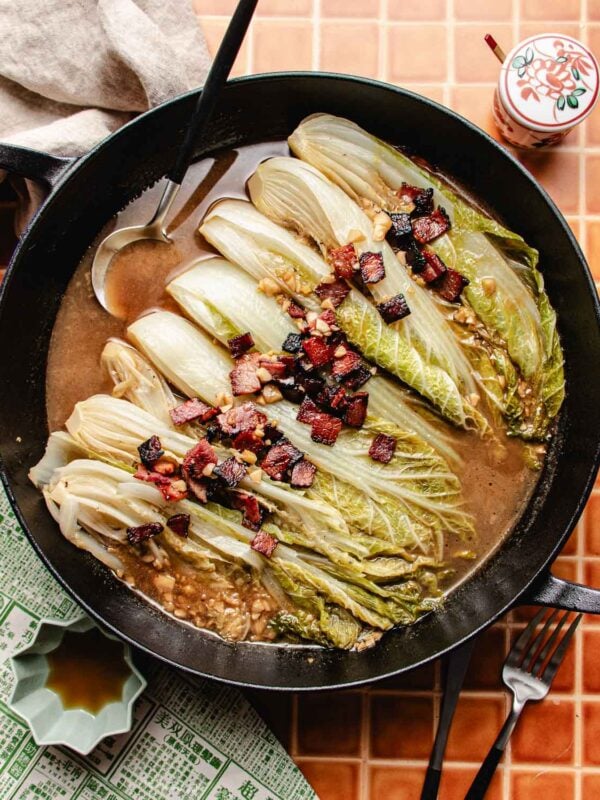
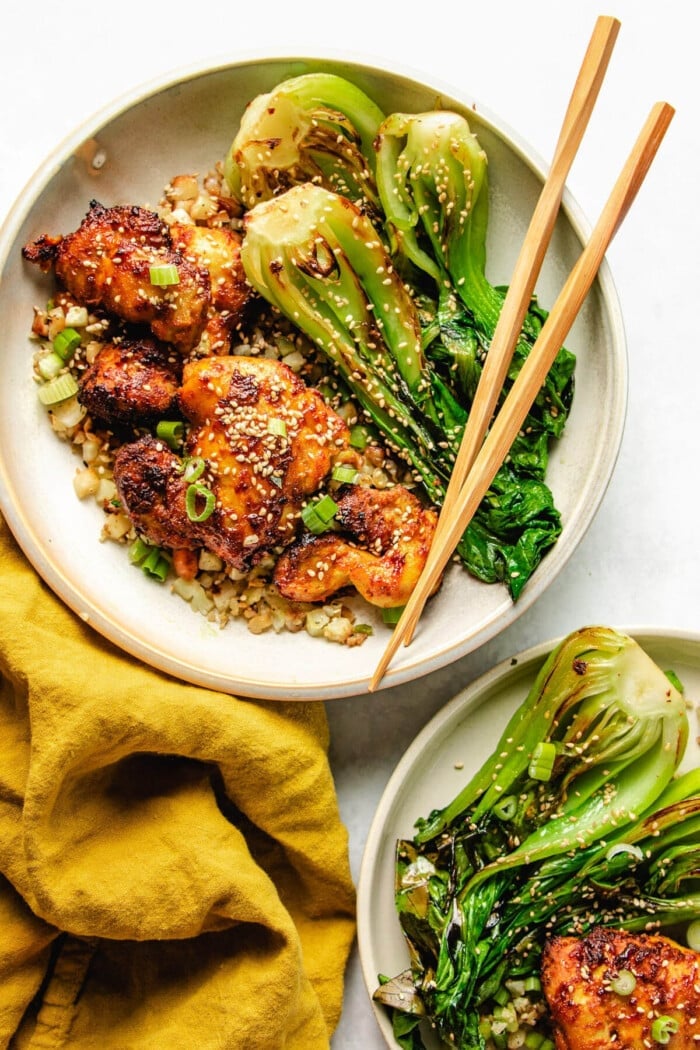








This was my first time trying these eggplants and I am now obsessed! This was sooo delicious. Thanks for the recipes!
Thank you so much!
Great recipe
Thanks so much.